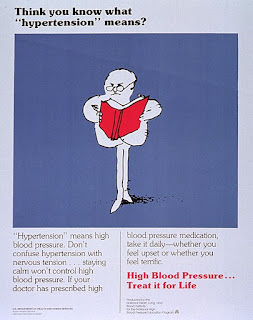 |
| Image Credit: By National Library of Medicine - History of Medicine (https://www.flickr.com/photos/nlmhmd/6946543395/) [No restrictions], via Wikimedia Commons |
Hypertension is characterized by sustained and repeated BP readings equaling or exceeding 140/90 mm of mercury and increases the risk of complications and death when compared to non-hypertensives. Conversely, if hypertension is detected and treated early, the risk of complications, like heart attack, heart failure, stroke, and kidney failure; and death can be minimized.
This post explains the harder and the remaining part of the title, i.e. Why Hypertension Occurs? It is hard to answer this question, and despite our best attempt, this post may still fail to answer it completely/satisfactorily.
To fully understand the "Why" part, it is important, to first address the "What" part.
What Changes In The Arteries Of Hypertensive People?
The search to understand the mystery behind hypertension dates back to almost a hundred years. The first studies that described "the changes occurring in arteries" were published in 1904, but it took the advances in electron microscopy to confirm the findings till the mid-1960s. What happens in hypertension is summarized below in a stepwise manner.
- The dominant change occurring in hypertension is the "increased wall thickness" and affects mainly the branches of arteries, called "arterioles".
- While, in larger arterioles, changes of increased wall thickness are a result of the increased number of "cells within the wall", on the other hand, increased wall thickness occurs in smaller arterioles due to a different reason, i.e. "deposition of non-cell material called deposits within their lumen".
- The common end result of the above processes leading to increased wall thickness is the occurrence of increased resistance to blood flow
- As a response to increased resistance, the heart tries to pump harder, thereby increasing the blood pressure.
Once the "What-Part" was addressed by scientists, the attention shifted to the "Why-Part". Let us also address the basic question of this series:
Why Does Hypertension Occur?
The exact mechanism of development of "increased wall thickness" is not known. But scientists have been able to clearly identify the high-risk people and have also proposed some theories as an explanation.
Risk factors and high-risk groups
The percentage of people suffering from hypertension increases with age. The risk of developing hypertension is strongly influenced by what one eats. Excessive salt intake increases the risk for hypertension, and a diet rich in fruit, vegetables reduces the risk of hypertension.
People who have a high chance of developing hypertension include those with affected parents, metabolic syndrome, diabetes, obesity, pregnant women in the latter half of their pregnancy, and children born with low birth weight.
Theories which explain hypertension
Multiple theories have been proposed to explain hypertension and many of them are interrelated and individuals fail to explain the occurrence of hypertension in every affected person. Some of such theories that are being currently investigated are listed below:- Hypertension is caused due to sodium excess and potassium deficit. This is the oldest and most popular theory and many of the medicines, as well as salt-restricted diet, are recommended in hypertensives as a result of this theory.
- Hypertension is caused due to a generalized inflammatory and immune system response by the body. This theory is of recent origin and finds merit in raised inflammation/immune markers in the blood of many hypertensives.
- Hypertension is caused due to an abnormal localized immune response in the organ called Thymus. Thymus was initially supposed to have few functions in humans but recently, its abnormality has been proposed as a cause of hypertension.
- Hypertension is caused due to abnormalities in the functioning of mitochondria. Mitochondria are the sites of energy generation in cells and are also called the powerhouse of cells. Studies have reported multiple abnormalities of mitochondria of blood vessels and heart in hypertensives.
- Hypertension is caused by abnormal microbial composition in the gut. The large intestine of humans has microbes that coexist and do not normally harm. In hypertensives, this composition is altered in diversity and richness.
About the author: Dr. Naval Asija is a licensed MBBS Physician from India. MBBS is the equivalent of the MD degree offered by international medical schools. He is based in Delhi, India, and works as a medical writer, editor, and consultant. He supports medical researches as an author's editor, medical communication companies involved in medico-marketing activities, and medical technology companies in improving their products. He can be contacted via his LinkedIn Profile: https://www.linkedin.com/in/navalasija/
Disclaimer: The content provided here is NOT a substitute for professional medical advice. If you consider taking any action based on the above information, we recommend that it should be first confirmed with your doctor. Our detailed disclaimer statement can be read at our homepage




I am searching for and I want to post a remark that "The substance of your post is marvelous" Great work.for information regarding hypertension service please visit to the link.
ReplyDeleteall you need to know about hypertension
Thank you Welltopia, and Dr. Sandeep Gupta. The shared post is indeed informative and useful.
Delete